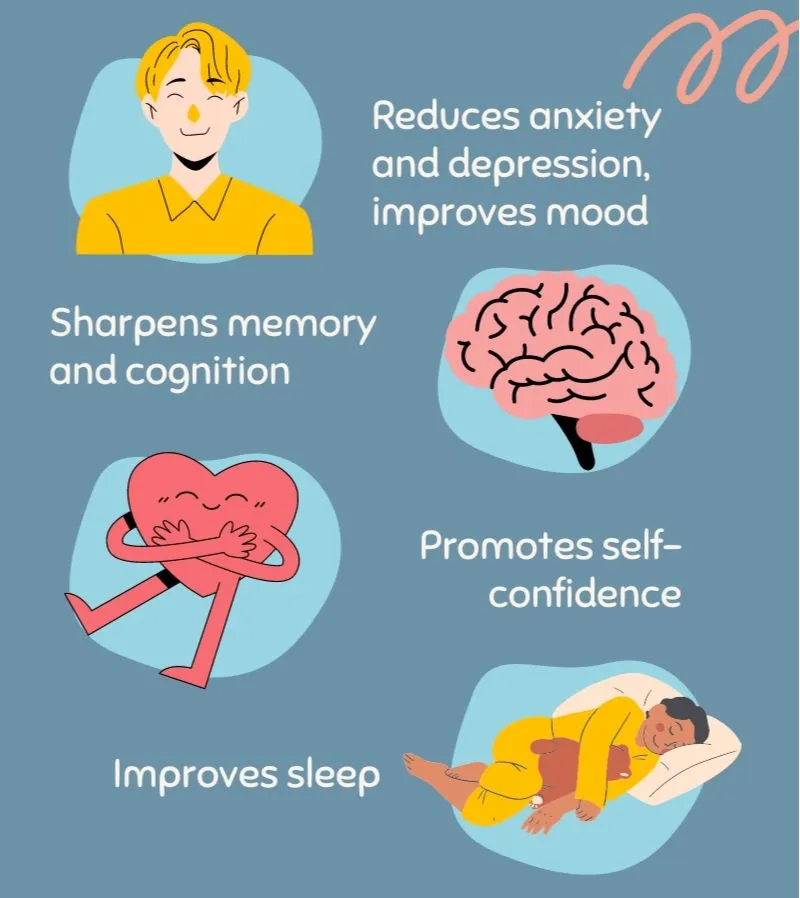
Regular exercise is not just good for your physical health; it can also have a profound impact on your mental well-being. In fact, numerous studies have shown that staying active can help improve mood, reduce stress, anxiety, and depression, and boost overall mental health. In this article, we will explore the ways in which regular exercise can benefit your mental health and provide tips on incorporating physical activity into your daily routine.
1. Releases Endorphins
When you exercise, your body releases chemicals called endorphins, which are known as “feel-good” hormones. These endorphins act as natural painkillers and mood elevators, helping to reduce feelings of stress and anxiety. Regular physical activity can help increase the production of endorphins, leading to improved mood and a greater sense of well-being.
2. Reduces Stress and Anxiety
Exercise is a great way to relieve stress and anxiety. Physical activity can help distract you from daily worries and give you a break from negative thoughts. Additionally, exercise can also help your body and mind to relax, reducing muscle tension and promoting a sense of calmness. Whether it’s going for a run, practicing yoga, or lifting weights, finding a form of exercise that you enjoy can be a powerful tool for managing stress and anxiety.
3. Improves Sleep
Regular exercise can also improve the quality of your sleep. Physical activity helps regulate your body’s internal clock, making it easier to fall asleep and stay asleep throughout the night. Exercise can also help reduce symptoms of insomnia and other sleep disorders. By incorporating exercise into your daily routine, you may find that you are able to get a better night’s rest and wake up feeling more refreshed and rejuvenated.
4. Boosts Self-Esteem
Engaging in regular exercise can boost your self-esteem and confidence. As you set and achieve fitness goals, you may feel a sense of accomplishment and pride in your abilities. Physical activity can also help improve your body image and overall sense of self-worth. Whether it’s losing weight, gaining muscle, or improving your endurance, exercise can help you feel more confident in yourself and your abilities.
5. Increases Brain Function
Exercise has been shown to improve cognitive function and brain health. Physical activity can help increase blood flow to the brain, promoting the growth of new brain cells and improving overall brain function. Regular exercise has also been linked to better memory, focus, and attention span. By staying active, you can keep your mind sharp and improve your mental clarity and cognitive abilities.
6. Provides Social Interaction
For many people, exercise provides an opportunity for social interaction and connection. Joining a fitness class, playing a team sport, or going for a walk with a friend can help combat feelings of loneliness and isolation. Socializing while exercising can also help boost your mood and provide a sense of community and support. By incorporating exercise into your social life, you can improve your mental health and overall well-being.
7. Tips for Incorporating Exercise Into Your Routine
If you’re looking to improve your mental health through exercise, here are some tips for incorporating physical activity into your daily routine:
- Find an activity you enjoy: Whether it’s running, swimming, dancing, or hiking, choose a form of exercise that you love and look forward to.
- Set realistic goals: Start small and gradually increase the intensity and duration of your workouts. Setting achievable goals can help keep you motivated and on track.
- Make it a habit: Schedule time for exercise in your daily routine and make it a priority. Consistency is key to reaping the mental health benefits of regular physical activity.
- Get creative: Mix up your workouts to keep things interesting and prevent boredom. Try new activities, join a group fitness class, or explore different outdoor settings for exercise.
- Listen to your body: Pay attention to how exercise makes you feel and adjust your routine as needed. Rest when you need to and don’t push yourself too hard.
Conclusion
In conclusion, regular exercise can have a powerful impact on your mental health. From boosting mood and reducing stress to improving sleep and self-esteem, staying active can help you feel happier, more relaxed, and more confident. By incorporating physical activity into your daily routine and finding ways to make exercise enjoyable and sustainable, you can reap the many benefits that exercise has to offer for your mental well-being.
#Regular #Exercise #Improve #Mental #Health